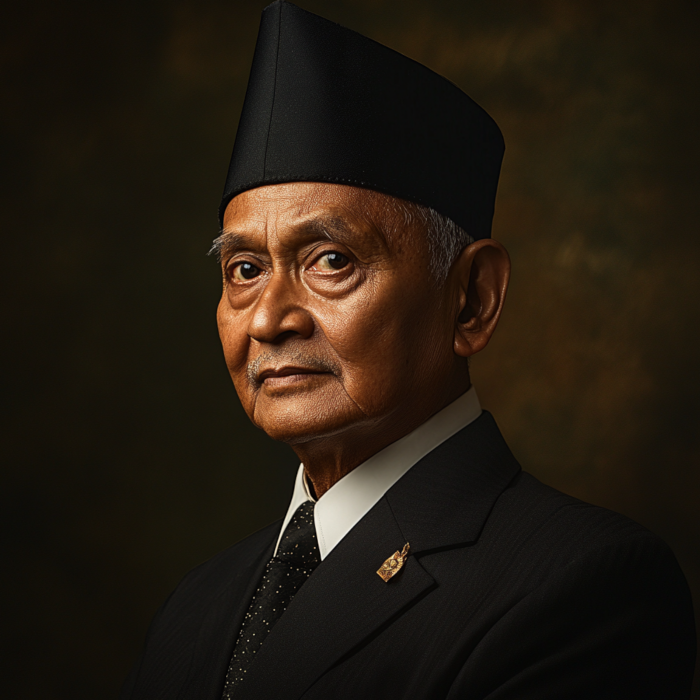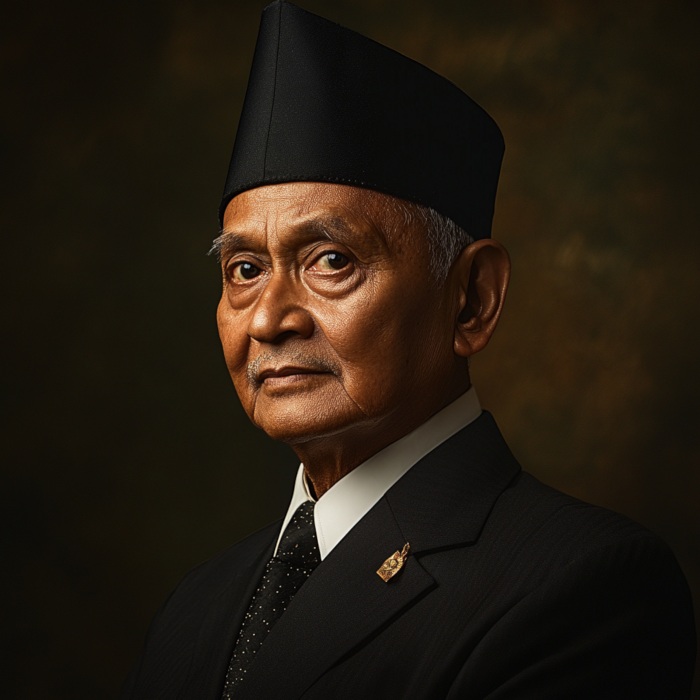


Bacharuddin Jusuf Habibie (1936–2019), commonly known as B.J. Habibie, was the third President of Indonesia, serving from 1998 to 1999. He took office during one of the most turbulent times in Indonesian history, following the resignation of President Suharto after 31 years of authoritarian rule. Habibie is best known for his role in guiding Indonesia through its transition from dictatorship to democracy, overseeing significant political reforms and responding to the economic crisis that struck the country in the late 1990s. He was also a highly respected engineer, known for his contributions to the Indonesian aerospace industry.
Birth and Family Background: Habibie was born on June 25, 1936, in Parepare, South Sulawesi, Indonesia, to a well-educated and influential family. His father, Alwi Abdul Jalil Habibie, was an agriculturist, and his mother, R.A. Tuti Marini Puspowardojo, came from a noble Javanese family. Habibie was the fourth of eight children and grew up in a household that valued education and public service.
Education and Engineering Career: Habibie excelled academically from a young age. After completing his early education in Indonesia, he went to Germany in 1955 to pursue higher education in aeronautical engineering. He studied at the Technische Hochschule Aachen (now RWTH Aachen University) and obtained both his undergraduate and doctoral degrees in engineering.
After completing his studies, Habibie worked for several leading aerospace companies in Germany, where he gained recognition for his expertise in aircraft design and aerodynamics. He developed several key theories in aeronautics, including the Habibie Factor, which addressed the efficient use of lightweight materials in aircraft design. His accomplishments in the field earned him a stellar reputation in both the academic and engineering communities.
Return to Indonesia (1974): After living and working in Germany for nearly two decades, Habibie returned to Indonesia in 1974 at the request of President Suharto. Suharto sought to modernize Indonesia’s industry and infrastructure, and he saw Habibie’s expertise in aerospace engineering as a key asset for his development plans. Habibie was appointed as the Minister of Research and Technology and later served as the head of Indonesia’s Strategic Industries.
Under Habibie’s leadership, Indonesia launched several ambitious technological projects, including the establishment of IPTN (Indonesian Aerospace), the country’s first aircraft manufacturing company. Habibie’s vision was to transform Indonesia into a high-tech industrial nation, and he was instrumental in developing the country’s aerospace, defense, and telecommunications industries.
Political Career: Despite being primarily known for his technical expertise, Habibie became increasingly involved in politics during his time in Suharto’s government. He became a trusted advisor to Suharto and was appointed vice president in March 1998, just months before the collapse of Suharto’s regime. His close relationship with Suharto made him a controversial figure, especially as Suharto’s authoritarian rule faced growing opposition from pro-democracy activists.
Suharto’s Resignation and Transition to Power: In May 1998, amid a severe economic crisis, widespread protests, and escalating political unrest, Suharto resigned after 31 years in power. As vice president, Habibie was constitutionally next in line to the presidency. His sudden ascension to the presidency occurred at a time of deep turmoil: Indonesia was grappling with the effects of the Asian Financial Crisis, mass unemployment, social unrest, and demands for political reform.
Political Reforms: Despite being closely associated with Suharto’s regime, Habibie surprised many by quickly initiating a series of democratic reforms. His government enacted crucial political changes, including:
These reforms were critical in transitioning Indonesia from an authoritarian regime to a democratic system. While Habibie’s presidency was brief, his legacy as a reformer is significant, as he set in motion the processes that allowed Indonesia to become the world’s third-largest democracy.
East Timor Referendum: One of the most controversial decisions of Habibie’s presidency was his handling of the East Timor issue. East Timor, a former Portuguese colony, had been annexed by Indonesia in 1975 under Suharto’s rule, but its integration into Indonesia was widely disputed, and an independence movement persisted for years. Under growing international pressure and amid escalating violence, Habibie agreed to hold a referendum in East Timor to decide whether it would remain part of Indonesia or become independent.
The referendum, held in August 1999, resulted in an overwhelming vote for independence, but the aftermath was marred by violence as pro-Indonesian militias, with the support of elements within the Indonesian military, attacked civilians and destroyed infrastructure in East Timor. The international community, led by the United Nations, intervened to restore order, and East Timor eventually gained its independence in 2002. Habibie’s decision to allow the referendum, while controversial, was a crucial step in resolving a longstanding conflict.
Economic Recovery Efforts: During Habibie’s presidency, Indonesia was still reeling from the 1997 Asian Financial Crisis, which had caused a collapse in the country’s banking system, a sharp rise in inflation, and a severe contraction of the economy. Habibie worked to stabilize the economy by implementing reforms demanded by the International Monetary Fund (IMF), including austerity measures and structural adjustments. While these policies helped to stabilize the economy, they were deeply unpopular with many Indonesians, who suffered from high unemployment and poverty.
Election and Transition of Power: In 1999, after serving as president for just over a year, Habibie faced growing political pressure. His government’s handling of the East Timor crisis, combined with economic challenges, diminished his popularity. When Indonesia held its first democratic elections in 1999, Habibie chose not to run for president and instead oversaw a peaceful transfer of power to Abdurrahman Wahid, marking a historic moment in Indonesia’s democratic transition.
Role in Indonesian Democracy: Despite his relatively short time in office, Habibie’s legacy as a key figure in Indonesia’s democratic transformation is widely acknowledged. His commitment to political reforms, free speech, and democratization allowed Indonesia to move away from decades of authoritarian rule under Suharto. Habibie is often credited with laying the foundation for Indonesia’s democratic institutions and fostering a culture of political pluralism.
Technological Contributions: In addition to his political legacy, Habibie is remembered for his contributions to Indonesia’s technological and industrial development, particularly in the aerospace sector. His work in establishing Indonesia’s aircraft industry and promoting science and technology remains a source of national pride.
Later Life and Statesmanship: After leaving office, Habibie remained an influential public figure, though he largely stayed out of active politics. He continued to advocate for education, science, and technology, and he frequently spoke about his vision for Indonesia’s future. Habibie also wrote several books about his experiences in politics and his views on democracy, leadership, and governance.
Death and National Mourning: B.J. Habibie passed away on September 11, 2019, at the age of 83, due to heart failure. His death prompted a national outpouring of grief, with thousands of Indonesians paying tribute to him. He was given a state funeral, and his legacy as a reformer and statesman was widely commemorated.
B.J. Habibie’s legacy is that of a visionary technocrat who played a crucial role in Indonesia’s transition from authoritarian rule to democracy. While his presidency was marked by challenges,
including economic difficulties and the East Timor crisis, Habibie is widely respected for his efforts to democratize Indonesia, promote free speech, and oversee the country’s first free elections. His decision to allow the East Timor referendum, though controversial, was a decisive step in resolving a long-standing conflict. Habibie’s contributions to science and technology, particularly in Indonesia’s aerospace industry, further solidified his status as a national figure.
Despite serving only a brief time as president, Habibie’s impact on Indonesia’s political and economic landscape was profound. He remains a symbol of Indonesia’s journey toward democracy and modernization, and his legacy is celebrated as a key chapter in the country’s history.

We use cookies
We use cookies and other tracking technologies to improve your browsing experience on our website, to show you personalized content and targeted ads, to analyze our website traffic, and to understand where our visitors are coming from. Privacy Policy.